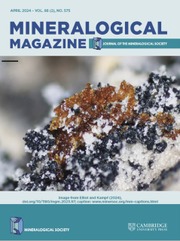Crossref Citations
This article has been cited by the following publications. This list is generated based on data provided by
Crossref.
Turley, Carol
and
Findlay, Helen S.
2009.
Climate Change.
p.
367.
Falkenberg, Laura J.
Burnell, Owen W.
Connell, Sean D.
and
Russell, Bayden D.
2010.
Sustainability in Near-shore Marine Systems: Promoting Natural Resilience.
Sustainability,
Vol. 2,
Issue. 8,
p.
2593.
2011.
Oceanic Acidification.
2011.
Oceanic Acidification.
Kerrison, Philip
Hall-Spencer, Jason M.
Suggett, David J.
Hepburn, Leanne J.
and
Steinke, Michael
2011.
Assessment of pH variability at a coastal CO2 vent for ocean acidification studies.
Estuarine, Coastal and Shelf Science,
Vol. 94,
Issue. 2,
p.
129.
Lough, Janice M.
and
Cooper, Timothy F.
2011.
New insights from coral growth band studies in an era of rapid environmental change.
Earth-Science Reviews,
Vol. 108,
Issue. 3-4,
p.
170.
Zeng, JianWei
Xu, Ran
and
Gong, YiMing
2011.
Hydrothermal activities and seawater acidification in the Late Devonian F-F transition: Evidence from geochemistry of rare earth elements.
Science China Earth Sciences,
Vol. 54,
Issue. 4,
p.
540.
Roleda, Michael Y.
Boyd, Philip W.
and
Hurd, Catriona L.
2012.
BEFORE OCEAN ACIDIFICATION: CALCIFIER CHEMISTRY LESSONS1.
Journal of Phycology,
Vol. 48,
Issue. 4,
p.
840.
Roleda, Michael Y.
and
Hurd, Catriona L.
2012.
Seaweed Biology.
Vol. 219,
Issue. ,
p.
407.
Kerrison, Philip
Suggett, David J.
Hepburn, Leanne J.
and
Steinke, Michael
2012.
Effect of elevated pCO2 on the production of dimethylsulphoniopropionate (DMSP) and dimethylsulphide (DMS) in two species of Ulva (Chlorophyceae).
Biogeochemistry,
Vol. 110,
Issue. 1-3,
p.
5.
Huang, Zhijun
Li, Fengbo
Chen, Bingfeng
Lu, Tao
Yuan, Yin
and
Yuan, Guoqing
2013.
Well-dispersed g-C3N4 nanophases in mesoporous silica channels and their catalytic activity for carbon dioxide activation and conversion.
Applied Catalysis B: Environmental,
Vol. 136-137,
Issue. ,
p.
269.
Chen, Bingfeng
Li, Fengbo
Huang, Zhijun
Lu, Tao
Yuan, Yin
and
Yuan, Guoqing
2014.
Integrated Catalytic Process to Directly Convert Furfural to Levulinate Ester with High Selectivity.
ChemSusChem,
Vol. 7,
Issue. 1,
p.
202.
Yang, Shihong
Jiang, Zewei
Sun, Xiao
Ding, Jie
and
Xu, Junzeng
2018.
Effects of Biochar Amendment on CO2 Emissions from Paddy Fields under Water-Saving Irrigation.
International Journal of Environmental Research and Public Health,
Vol. 15,
Issue. 11,
p.
2580.
Wibawa, B S S
Iswara, A P
and
Boedisantoso, R
2020.
Impact Assessment of Coal Power Plant Using Life Cycle Assessment (LCA).
IOP Conference Series: Earth and Environmental Science,
Vol. 506,
Issue. 1,
p.
012023.
Ilhami, Bq Tri Khairina
Kawaroe, Mujizat
Effendi, Hefni
and
Zamani, Neviaty Putri
2020.
THE EFFECT OF ACIDIFICATION ON GROWTH AND PHOTOSYNTHESIS RATE OF SEAGRASS Thalassia hemprichii (Ehrenberg.) Ascherson.
Jurnal Ilmu dan Teknologi Kelautan Tropis,
Vol. 12,
Issue. 3,
p.
687.
Kannan, Govindarajan
and
Sujatha, Evangelin Ramani
2023.
Crustacean polysaccharides for the geotechnical enhancement of organic silt: A clean and green alternative.
Carbohydrate Polymers,
Vol. 299,
Issue. ,
p.
120227.


